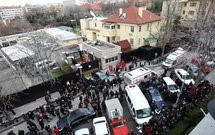 The Feb. 1 attack on the U.S. Embassy in Ankara comes as Turkey is struggling to manage increasing instability in its periphery and in the region. Due to security systems in place at the compound, the damage caused by the attack was limited, and security inside the embassy's outer perimeter was not breached.
The Feb. 1 attack on the U.S. Embassy in Ankara comes as Turkey is struggling to manage increasing instability in its periphery and in the region. Due to security systems in place at the compound, the damage caused by the attack was limited, and security inside the embassy's outer perimeter was not breached.
The Turkish Interior Ministry has identified the bomber as a member of the Revolutionary People's Liberation Party/Front, a splinter group of Devrimci Sol. While the group's involvement remains unconfirmed, the decision to strike a Western target is more in keeping with the Revolutionary People's Liberation Party/Front than it is with Turkey's more prolific militant group, the the Kurdistan Workers' Party, known by its Kurdish initials PKK.
Ankara has been actively pursuing negotiations with the PKK, and there is an incentive for some PKK elements to derail the peace process. But such an attack on a Western target would not fit the group's profile, and there are other elements in Syria, Iran and al Qaeda that would be interested in sending a message to Ankara.
Analysis
The explosion hit a security checkpoint entrance in front of the embassy at around 1:15 p.m., killing two people and critically injuring another. According to Hurriyet Daily News, the suicide bomber detonated his explosives while going through the magnometer at the embassy.
Photos and video of the embassy's visitor-screening building show evidence of masonry damage and a shattered bulletproof window. The door to the security checkpoint was also blown off its hinges, indicating the attacker was equipped with a fairly large amount of explosives for a suicide bomber. The attacker probably hoped to penetrate the actual embassy building but was forced to detonate when he was detected at the security checkpoint outside the compound. The fact that he was forced to do so demonstrates the effectiveness of the layered security system in place at the facility. The blast killed the attacker and a security guard while wounding another guard, but the security system worked as designed.
Discerning the Attacker's Motive
So far, there has been no claim of responsibility. The last time a successful attack on a Western target in Turkey occurred was in November 2003, when the Istanbul headquarters of HSBC Bank and the British Consulate were hit, killing 40 people and wounding hundreds of others. The 2003 bombings were allegedly carried out by Islamist militants affiliated with al Qaeda. In 2008, a failed armed assault on the U.S. Consulate in Istanbul was blamed on grassroots jihadists with claimed links to al Qaeda. That attack left three assailants and three policemen dead in a shootout.
The Feb. 1 attack could have several possible perpetrators. The PKK is the most active militant group in Turkey but is typically wary of targeting Western interests; the group does not want to isolate itself politically and risk vital external support from the Kurdish diaspora. Al Qaeda affiliates are known to operate in Turkey and have grown stronger in the region due to power vacuums in Syria and Iraq. At the same time, Syria and Iran have threatened Turkey over its substantial backing of the Syrian rebellion and thus could use an attack to discourage Turkey from trying to bring down the Syrian regime.
In fact, Syrian regime operatives are already operating in Turkey. Five people, including a former Turkish intelligence official, are on trial for abducting a member of the Syrian opposition and delivering him to the Syrian regime in 2011. On Jan. 29, Turkish security forces acting on an intelligence tip foiled a kidnapping attempt on a Syrian opposition figure in Hatay province. Three of the accused kidnappers were detained, while a fourth managed to escape. The opposition figure was rescued.
But several signs point to the Revolutionary People's Liberation Party/Front, which like other militant groups has been known to use suicide bombers. In fact, the group deployed a suicide bomber to attack a police station in Ankara as recently as September 2012. But more important, the group has no compunction to hit Western targets -- indeed, it has threatened to do so in the past. And its former parent group, Devrimci Sol, conducted more than 20 attacks against the United States and NATO during the Persian Gulf War.
The timing of the attack is notable, given that Turkey is struggling to manage emerging conflicts in its periphery as it tries to advance peace talks with the Kurds. The targeting of the U.S. Embassy does not fit squarely in the PKK profile, and there are a number of other players interested in targeting U.S. and Turkish interests. Nonetheless, the attack takes place at a politically sensitive time in Turkey -- a time when many doubt whether the government can manage the array of militant threats in the country.
Courtesy : Stratfor (www.stratfor.com)